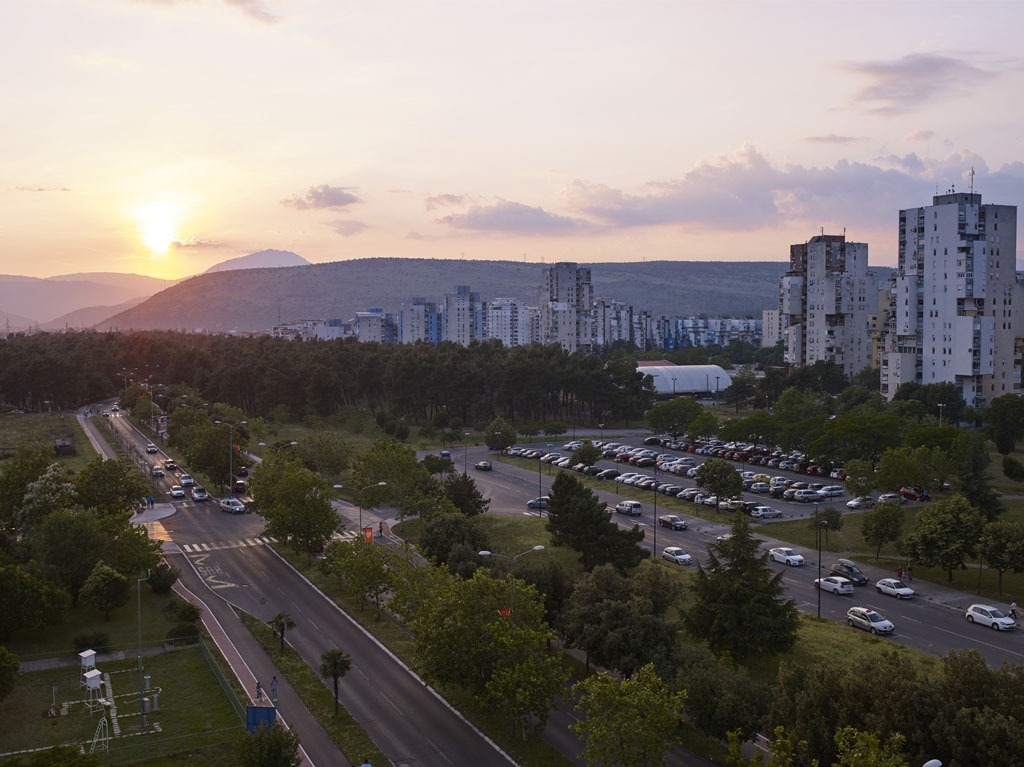26-08-16 // PINK FLAMINGOS AND MUSCULAR MEN – INTERVIEW WITH BART LOOTSMA AND DIJANA VUCINIC

1970’s housing in Podgorica in Montenegro, an example of socialist architecture of the city, designed by architects Vukota Tupa Vukotic and Mileta Bojovic
Photo by Luka Boskovic
Bernd Upmeyer interviewed Bart Lootsma and Dijana Vucinic. Lootsma is a historian, theoretician, critic and curator in the fields of architecture, design and the visual arts. He is Head of the Institute for Architectural Theory, History and Heritage Preservation at the University of Innsbruck. Together with Katharina Weinberger he curated the Project Solana Ulcinj for the Montenegrin pavilion at the 2016 Venice Biennale. Dijana Vucinic is an architect and currently leading a team in the Government of Montenegro, working on a portfolio that includes many emerging projects in architecture and urbanism. She is a commissioner for Montenegro pavilion at XV Venice Architecture Biennale. The interview took place in August 2016.
Urban Challenges of a Newly Independent Country
Bernd Upmeyer: Montenegro is a fairly new country that became independent only ten years ago in the year 2006. Where do you see the biggest challenges but also the greatest potentials due to this independence when it comes to Montenegro’s cities, especially to its capital Podgorica, but also for cities such as Cetinje, or coastal towns such as Ulcinj or Kotor?
Bart Lootsma: Independence is a relative phenomenon these days. No country and no city can really be independent. We’re all depending on global flows of money, goods and people. On one hand, the independence of a small country –and even of a bigger country like the United Kingdom as we currently see- may guarantee a certain amount of autonomy in certain issues. On the other it is vulnerable to the degree in which it can realize its collective needs and desires because the tax revenues are limited, unless there are exceptional tax benefits attracting capital (as in Luxembourg, Monaco, Switzerland) which will always be disputed by the neighboring countries; exceptional natural resources on its territory like oil; or the strategic position is such that the country is a port or gateway to other countries (Singapore, Hong Kong). Montenegro does not really have one of these benefits. It still struggles with the side effects and after effects from the privatizations after the falling apart of Yugoslavia. The old industry, losing national planning and protection, cannot compete internationally yet, and a new one will have to be invented and financed…
Dijana Vucinic: Being independent again from the rest of Yugoslavia, but then not so independent within an international context – considering EU integration, NATO membership and other financial and political implications might send one into the wrong direction when it comes to articulating the challenges we are facing.
Foreign and local capital influences the course of the development of the city on many levels, which is particularly significant for a small country like Montenegro. Preserving the identity within the cities and culture while heading towards the EU and struggling to meet contemporary demands in the urban environment is one of the biggest challenges for Montenegro or other countries that went through very significant social, political and economic transformation from socialism. This transformation is actually the one that is substantial for the present and the future of Montenegrin cities. Socialist architectural heritage in the cities of former Yugoslavia is very potent and putting these spaces in right use or finding the smart way to transform them, upgrade and develop their potential further, in my opinion, would be the key to a successful city and the rich social and cultural life of it’s inhabitants…
…the complete interview was published in MONU #25 on the topic of Independent Urbanism on October 17, 2016.
Title: Pink Flamingos and Muscular Men
Project: Interview with Bart Lootsma and Dijana Vucinic
Date: August 2016
Type: Commissioned interview
Topic: Independent Urbanism
Organizer: MONU
Status: Published
Publications: MONU #25, P. 46-57
Interviewer: Bernd Upmeyer